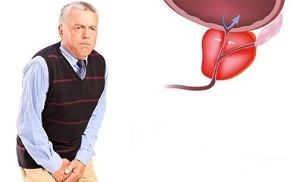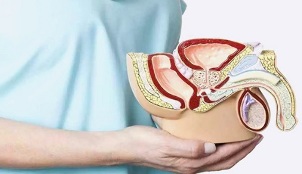
This insidious disease is one of the most common diseases in the male half of humanity. Many turn a blind eye to new worries and expect the inevitable development of all kinds of consequences that make normal life impossible. We will tell you about the symptoms and treatment of prostatitis in men.
Prostatitis, according to statistics, is an inflammation of the prostate gland that affects many men of all ages. Already at the age of thirty, one in three suffers from this disease, the number of patients increases dramatically over the years, and almost everyone who changes the age of sixty suffers from this or that disease. And this is only official data, but in fact the incidence is higher, but doctors simply can not give exact figures because men do not want to see a doctor.
From early childhood, boys are taught that a real man must be resilient, tolerant of pain and not pay attention to diseases. And there is no question of running to the doctor with the slightest feeling of anxiety. This rule is strictly followed by the majority of adult men who report their problems to doctors in the most extreme cases, sometimes in an ambulance or hospital.
Unfortunately, this also applies to prostatitis. The need to go to the toilet often, sometimes mild pain and discomfort when urinating, the first alarming "calls" such as some problems with libido and strength are explained by everything: a hard day's work, a scandal with the boss, a very stormy meeting the day before.
And most importantly - there is nothing to think about, everything will go by itself. There is a logic to this: in men, the first signs of prostatitis are not very clear, give the patient minimal discomfort and soon disappear. Only one thing is not taken into account: the painful symptoms passed, but the disease itself did not disappear. It only turns into a chronic form that does not manifest itself for a long time, and then worsens under the influence of negative factors and causes more suffering.
Even if you think that your health problems are not cursed and will soon go away without any treatment, know that they can be a harbinger of a serious illness. Make sure you see a doctor, get tested and get the necessary tests. Remember that if you do it urgently, the treatment of any disease will be easier and faster.
Causes of the disease
Prostatitis can often be caused by a variety of factors that have nothing to do with the reproductive system. This is one of the most insidious features of the disease.
Here are the most common causes of pancreatitis:
- Pathogenic microorganisms are one of the main causes of the disease. Initially, a person can be infected with any infectious disease: infectious urinary tract infections, sexually transmitted diseases, and in this case, unexpectedly ending with tonsillitis, sinusitis, bronchitis or hemorrhoids. Untreated tooth decay can also cause prostate problems in the future. From the farthest parts of the body from the prostate gland, pathogens enter it through the flow of blood, lymph and other biological fluids. To this must be added a weakened immune system in almost everyone, because a common cold with normal immunity cannot cause inflammation of one of the organs of the reproductive system.
- Circulatory disorders in the small pelvis - for this reason, rightly in second place on the list. Blood stasis, disruption of the normal blood supply, and consequent organ hypoxia occur due to physical inactivity, constant sitting at work and at home. This causes a significant increase in the size of the prostate. Similar changes are observed in overweight people.
- Frequent shaking and tension of the perineum muscles - some professionals, such as drivers, are prone to this.
- Hormonal imbalance - occurs in many diseases and has a very negative impact on prostate health.
- Hypothermia.
- Frequent constipation.
To reduce the likelihood of disease, it is necessary to monitor the regularity of sexual activity. Do not hesitate for a long time, and remember that too often sincere contact has a negative effect.
What forms of the disease are isolated

- Bacterial prostatitisis caused by pathogenic bacteria. It can be acute (more common in young people) and chronic. Recent studies show that, as a rule, the infection affects the already pathologically altered tissues of the gland, and with severe circulatory disorders.
- Bacterial or non-bacterial prostatitis- Although laboratory tests do not show the presence of pathogenic microorganisms in the patient's body, their involvement in the process can not be completely ruled out.
- Prostatodinia- all the symptoms of prostatitis are present, but no inflammation of the gland is detected.
How prostatitis manifests itself
To detect the disease in time, you need to know what are the symptoms of prostatitis in men. The most characteristic feature is the acute form of the disease.
- Weakness and general weakness.
- Cold and fever.
- Increased body temperature.
- Headache.
- Severe pain in the perineum and groin area worsening with urine and feces.
- Often the need to go to the toilet and the patient's desire to urinate again after a period of urination, because the bladder is not completely emptied.
- A serious condition that requires urgent medical attention is characterized by acute urinary retention.
- Nervousness, nervousness.
Symptoms of chronic prostatitis
The chronic form of the disease can be asymptomatic for many years, and the symptoms can be easily confused with the manifestations of other diseases.
Let's see how this disease manifests itself:
- Pain in the pelvis and lower back- pain comes from the perineum in the lower abdomen, urethra, testicles. In addition, the patient feels back pain that spreads to the leg, which can often be mistaken for sciatica or other neuralgia. The pain may be concentrated or it may seem like everyone is in pain.
- Difficulty and frequent urination- Pain usually occurs when a patient starts or stops urinating. At the same time, it is impossible to tolerate and hold urine: despite the fact that the man has recently gone to the toilet, the sensations seem to fill as the bladder is full. Very little urine is excreted when urinating in a weak stream.
- Decreased sexual activity- a long-lasting inflammatory process, circulatory disorders, pathological changes in prostate tissue can not be in vain, resulting in a significant decrease in libido and potency. This is because the nerves pass through the gland, which transmits impulses to the brain centers responsible for erection. One of the consequences of the disease is damage to these nerves, loss of sensitivity and the development of disorders in the intimate area. At first, the erection does not lose its strength, at the same time premature ejaculation is observed, then the erection itself becomes very weak and orgasm slows down. Testosterone synthesis is gradually inhibited and sexual desire is catastrophically reduced. In some cases, a man feels a sharp pain in the head of the penis during ejaculation.
- Scarring and organ size reduction in prostate tissue.In advanced cases, this process spreads to the urinary tract and bladder, causing severe urinary incontinence. All this leads to the development of renal dysfunction, the development of urolithiasis and other serious conditions.

Treatment of various forms of the disease
We have seen the most common symptoms of prostatitis in men, now let's look at ways to treat this disease.

Although there are many studies devoted to the treatment of prostatitis, the general scheme of therapy is still unknown. Treatment may be different in each case, but it is certainly important to correctly identify the cause of the disease and begin treatment in the early stages of pathology.
In acute prostatitis of bacterial origin, the patient should be hospitalized, given antibiotic treatment, anti-inflammatory drugs, painkillers, drugs that normalize blood circulation.
The chronic form of the disease is very difficult to treat and is generally incurable. With successful treatment, men have a long remission period without signs and symptoms of prostatitis.
A set of therapeutic procedures is selected individually for each patient. The patient is prescribed non-steroidal anti-inflammatory drugs, drugs that improve blood circulation in the prostate, immunomodulatory drugs, vitamins. In addition, a man should undergo a course of physiotherapy, prostate massage and regular physical exercises aimed at maintaining the health of the prostate gland.
























